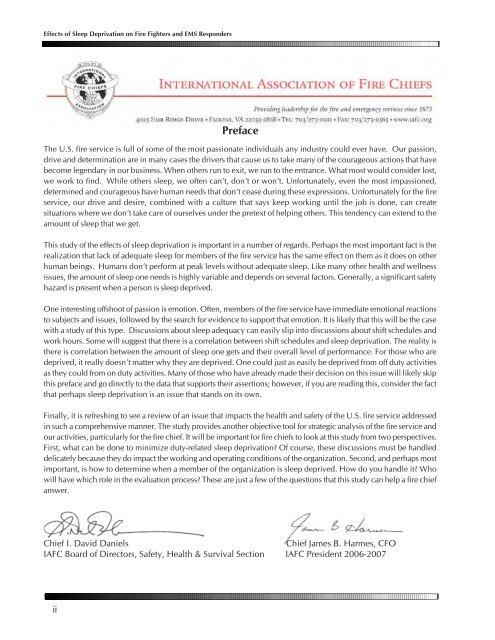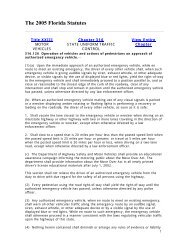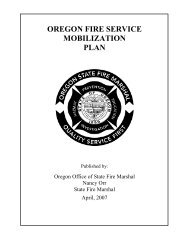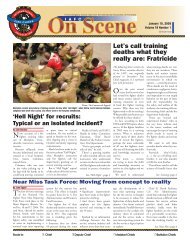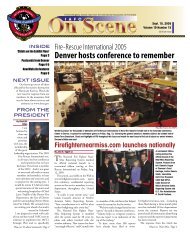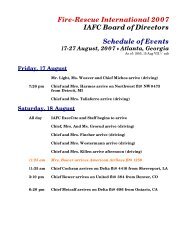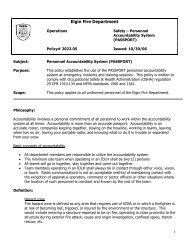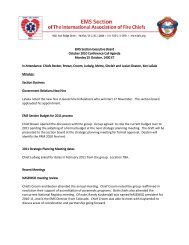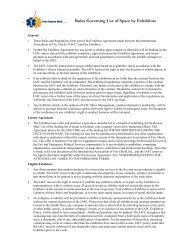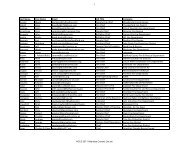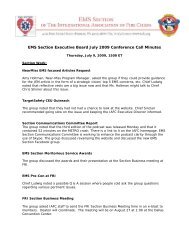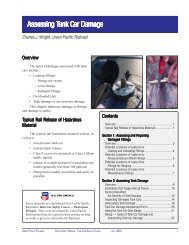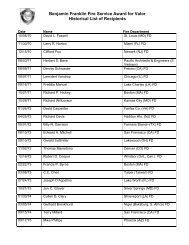Effects of Sleep Deprivation on Fire Fighters and EMS ... - NAEMT
Effects of Sleep Deprivation on Fire Fighters and EMS ... - NAEMT
Effects of Sleep Deprivation on Fire Fighters and EMS ... - NAEMT
You also want an ePaper? Increase the reach of your titles
YUMPU automatically turns print PDFs into web optimized ePapers that Google loves.
<str<strong>on</strong>g>Effects</str<strong>on</strong>g> <str<strong>on</strong>g>of</str<strong>on</strong>g> <str<strong>on</strong>g>Sleep</str<strong>on</strong>g> <str<strong>on</strong>g>Deprivati<strong>on</strong></str<strong>on</strong>g> <strong>on</strong> <strong>Fire</strong> <strong>Fighters</strong> <strong>and</strong> <strong>EMS</strong> Resp<strong>on</strong>ders<br />
Preface<br />
The U.S. fire service is full <str<strong>on</strong>g>of</str<strong>on</strong>g> some <str<strong>on</strong>g>of</str<strong>on</strong>g> the most passi<strong>on</strong>ate individuals any industry could ever have. Our passi<strong>on</strong>,<br />
drive <strong>and</strong> determinati<strong>on</strong> are in many cases the drivers that cause us to take many <str<strong>on</strong>g>of</str<strong>on</strong>g> the courageous acti<strong>on</strong>s that have<br />
become legendary in our business. When others run to exit, we run to the entrance. What most would c<strong>on</strong>sider lost,<br />
we work to find. While others sleep, we <str<strong>on</strong>g>of</str<strong>on</strong>g>ten can’t, d<strong>on</strong>’t or w<strong>on</strong>’t. Unfortunately, even the most impassi<strong>on</strong>ed,<br />
determined <strong>and</strong> courageous have human needs that d<strong>on</strong>’t cease during these expressi<strong>on</strong>s. Unfortunately for the fire<br />
service, our drive <strong>and</strong> desire, combined with a culture that says keep working until the job is d<strong>on</strong>e, can create<br />
situati<strong>on</strong>s where we d<strong>on</strong>’t take care <str<strong>on</strong>g>of</str<strong>on</strong>g> ourselves under the pretext <str<strong>on</strong>g>of</str<strong>on</strong>g> helping others. This tendency can extend to the<br />
amount <str<strong>on</strong>g>of</str<strong>on</strong>g> sleep that we get.<br />
This study <str<strong>on</strong>g>of</str<strong>on</strong>g> the effects <str<strong>on</strong>g>of</str<strong>on</strong>g> sleep deprivati<strong>on</strong> is important in a number <str<strong>on</strong>g>of</str<strong>on</strong>g> regards. Perhaps the most important fact is the<br />
realizati<strong>on</strong> that lack <str<strong>on</strong>g>of</str<strong>on</strong>g> adequate sleep for members <str<strong>on</strong>g>of</str<strong>on</strong>g> the fire service has the same effect <strong>on</strong> them as it does <strong>on</strong> other<br />
human beings. Humans d<strong>on</strong>’t perform at peak levels without adequate sleep. Like many other health <strong>and</strong> wellness<br />
issues, the amount <str<strong>on</strong>g>of</str<strong>on</strong>g> sleep <strong>on</strong>e needs is highly variable <strong>and</strong> depends <strong>on</strong> several factors. Generally, a significant safety<br />
hazard is present when a pers<strong>on</strong> is sleep deprived.<br />
One interesting <str<strong>on</strong>g>of</str<strong>on</strong>g>fshoot <str<strong>on</strong>g>of</str<strong>on</strong>g> passi<strong>on</strong> is emoti<strong>on</strong>. Often, members <str<strong>on</strong>g>of</str<strong>on</strong>g> the fire service have immediate emoti<strong>on</strong>al reacti<strong>on</strong>s<br />
to subjects <strong>and</strong> issues, followed by the search for evidence to support that emoti<strong>on</strong>. It is likely that this will be the case<br />
with a study <str<strong>on</strong>g>of</str<strong>on</strong>g> this type. Discussi<strong>on</strong>s about sleep adequacy can easily slip into discussi<strong>on</strong>s about shift schedules <strong>and</strong><br />
work hours. Some will suggest that there is a correlati<strong>on</strong> between shift schedules <strong>and</strong> sleep deprivati<strong>on</strong>. The reality is<br />
there is correlati<strong>on</strong> between the amount <str<strong>on</strong>g>of</str<strong>on</strong>g> sleep <strong>on</strong>e gets <strong>and</strong> their overall level <str<strong>on</strong>g>of</str<strong>on</strong>g> performance. For those who are<br />
deprived, it really doesn’t matter why they are deprived. One could just as easily be deprived from <str<strong>on</strong>g>of</str<strong>on</strong>g>f duty activities<br />
as they could from <strong>on</strong> duty activities. Many <str<strong>on</strong>g>of</str<strong>on</strong>g> those who have already made their decisi<strong>on</strong> <strong>on</strong> this issue will likely skip<br />
this preface <strong>and</strong> go directly to the data that supports their asserti<strong>on</strong>s; however, if you are reading this, c<strong>on</strong>sider the fact<br />
that perhaps sleep deprivati<strong>on</strong> is an issue that st<strong>and</strong>s <strong>on</strong> its own.<br />
Finally, it is refreshing to see a review <str<strong>on</strong>g>of</str<strong>on</strong>g> an issue that impacts the health <strong>and</strong> safety <str<strong>on</strong>g>of</str<strong>on</strong>g> the U.S. fire service addressed<br />
in such a comprehensive manner. The study provides another objective tool for strategic analysis <str<strong>on</strong>g>of</str<strong>on</strong>g> the fire service <strong>and</strong><br />
our activities, particularly for the fire chief. It will be important for fire chiefs to look at this study from two perspectives.<br />
First, what can be d<strong>on</strong>e to minimize duty-related sleep deprivati<strong>on</strong>? Of course, these discussi<strong>on</strong>s must be h<strong>and</strong>led<br />
delicately because they do impact the working <strong>and</strong> operating c<strong>on</strong>diti<strong>on</strong>s <str<strong>on</strong>g>of</str<strong>on</strong>g> the organizati<strong>on</strong>. Sec<strong>on</strong>d, <strong>and</strong> perhaps most<br />
important, is how to determine when a member <str<strong>on</strong>g>of</str<strong>on</strong>g> the organizati<strong>on</strong> is sleep deprived. How do you h<strong>and</strong>le it? Who<br />
will have which role in the evaluati<strong>on</strong> process? These are just a few <str<strong>on</strong>g>of</str<strong>on</strong>g> the questi<strong>on</strong>s that this study can help a fire chief<br />
answer.<br />
Chief I. David Daniels Chief James B. Harmes, CFO<br />
IAFC Board <str<strong>on</strong>g>of</str<strong>on</strong>g> Directors, Safety, Health & Survival Secti<strong>on</strong> IAFC President 2006-2007<br />
ii


